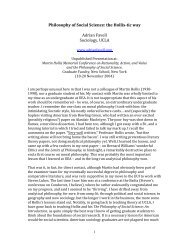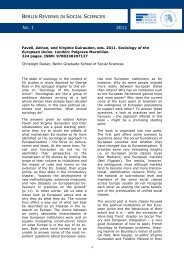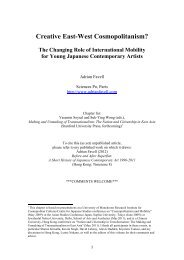Governmentality, political field or public sphere ... - Adrian Favell
Governmentality, political field or public sphere ... - Adrian Favell
Governmentality, political field or public sphere ... - Adrian Favell
You also want an ePaper? Increase the reach of your titles
YUMPU automatically turns print PDFs into web optimized ePapers that Google loves.
490 European Journal of Social The<strong>or</strong>y 14(4)EU studies is not a <strong>field</strong> in which sociologists have played a big part, even in Europe. Buta small number have become vocal in recent years about the need f<strong>or</strong> a m<strong>or</strong>e th<strong>or</strong>oughgoingconcern in sociology f<strong>or</strong> the study of the European Union (Delanty and Rumf<strong>or</strong>d,2005; <strong>Favell</strong> and Guiraudon, 2009). They and others (Dìez Medrano, 2003, 2008) arguef<strong>or</strong> a concern with the Europeanization of societies deeper and broader than theapproaches of <strong>political</strong> scientists and lawyers who dominate these debates that the EUoffers new ways of re-conceiving the relationship between state, society and the individual,<strong>or</strong> notions of cosmopolitanism and globalization (Rumf<strong>or</strong>d, 2002, 2008; Beck andGrande, 2004); <strong>or</strong> that sociology can be used to uncover societal sources of Europeanintegration – f<strong>or</strong> instance, in terms of social classes, netw<strong>or</strong>ks, <strong>or</strong> new f<strong>or</strong>ms of mobility– beyond the top-down policies and institutions of Brussels (Fligstein, 2008; Recchi and<strong>Favell</strong>, 2009; Mau, 2009; Mau and Verwiebe, 2010). At the same time, coming out of<strong>political</strong> science, a parallel set of <strong>political</strong> sociologists have end<strong>or</strong>sed a sociological turnin <strong>political</strong> science by showing how the ontological, epistemological and methodologicalpotential of sociological thinking about (variously) ideas, n<strong>or</strong>ms, culture, identity,institutions, netw<strong>or</strong>ks <strong>or</strong> agency in politics can question the assumptions and modelsof mainstream <strong>political</strong> science and IR scholars (Christiansen et al., 2001; Manners,2007; Saurugger, 2009; Parsons, 2010; Saurugger and Mérand, 2010). These approachestogether offer exciting new prospects f<strong>or</strong> rethinking the empirical terrain of ‘Europeanized’politics beyond the nation state – whether in terms of governance, policy-making, parliamentaryand legal politics, mobilization, <strong>or</strong> <strong>political</strong> communication.Many of the w<strong>or</strong>ks cited above are survey articles that are programmatic in nature:mapping the <strong>field</strong>, suggesting avenues of empirical research, but not usually going onfurther to specify much how sociological interventions might contribute to <strong>or</strong> changeparticular EU policy <strong>or</strong> politics debates. The sociological potential in EU studies is farfrom realized. As discussed in detail by <strong>Favell</strong> and Guiraudon (2009), part of the confusioncentres on the irresolvable issue of ‘what is sociology?’ in this context: whether<strong>political</strong> sociology is a somewhat peripheral branch of <strong>political</strong> science, <strong>or</strong> whether itshould be a rather different <strong>field</strong> rooted in the concepts and methods of hist<strong>or</strong>ical comparativesociology. It is also not clear what kind of sociology of the EU either of thesemight lead to if applied. We intend to take a different line here. ‘Who represents sociology?’is perhaps a m<strong>or</strong>e immediately easier question to answer. Such a question is likelyto lead quickly to a canon of eminent social the<strong>or</strong>ists as some of the most representative‘sociological’ thinkers of our time. Among these, three in particular are sure to be closeto the top: French hist<strong>or</strong>ian-philosopher, Michel Foucault; French anthropologistsociologistPierre Bourdieu; and German philosopher-sociologist Jürgen Habermas.These three thinkers have certainly laid down some of the most powerful and pervasivesociological paradigms of our times. And, not surprisingly, there is in fact a substantialliterature in EU studies associated with each. To build a case f<strong>or</strong> sociology in EU studies,then, our first aim is to discuss how Foucauldian, Bourdieusian and Habermasianapproaches have been used in EU studies, and what they have done to advance the sociologicalcause in the <strong>field</strong>.Yet, although an EU studies literature can easily be associated with each of theseapproaches (see <strong>Favell</strong>, 2006; Manners, 2007, f<strong>or</strong> surveys), they appear to be largelymarginal to the EU studies mainstream. Followers developing these paradigms have the





